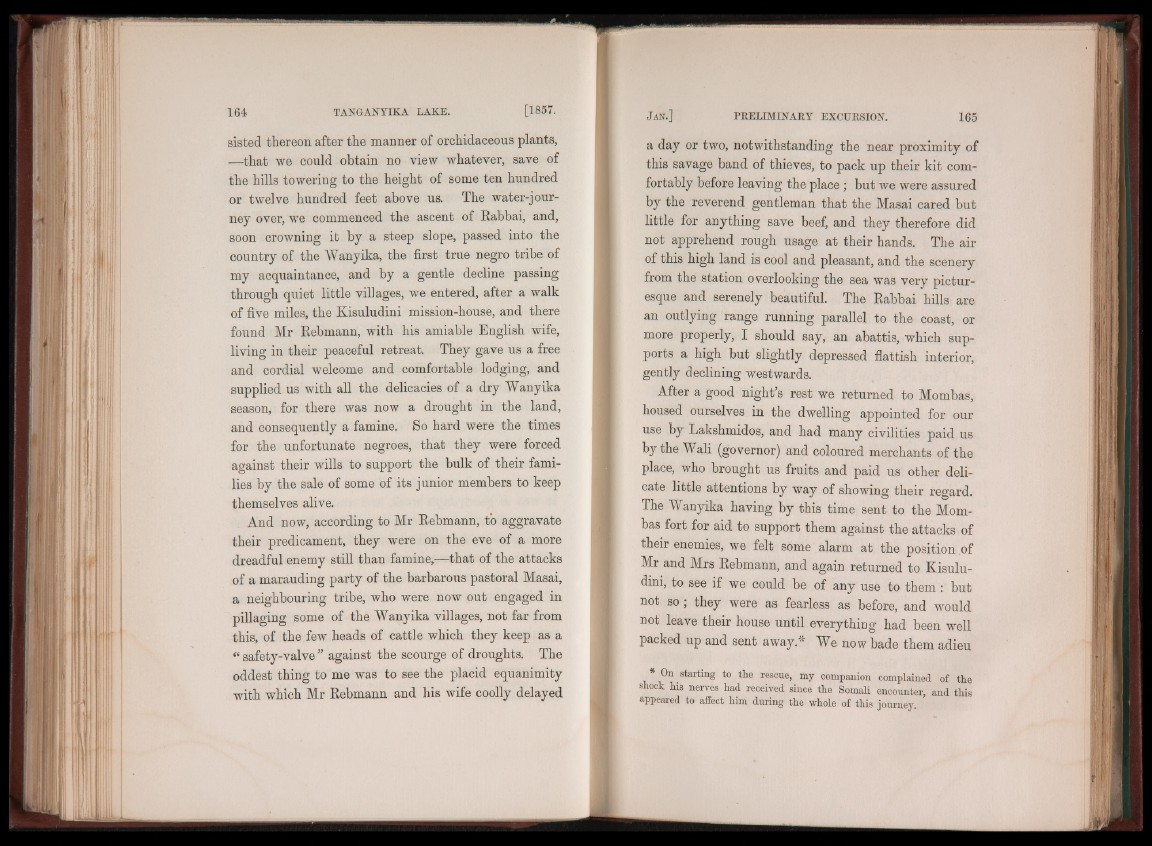
sisted thereon after the manner of orchidaceous plants,
—that we could obtain no view whatever, save of
the hills towering to the height of some ten hundred
or twelve hundred feet above us. The water-jour-
ney over, we commenced the ascent of Eabbai, and,
soon crowning it by a steep slope, passed into the
country of the Wanyika, the first true negro tribe of
my acquaintance, and by a gentle decline passing
through quiet little villages, we entered, after a walk
of five miles, the Kisuludini mission-house, and there
found Mr Eebmann, with his amiable English wife,
living in their peaceful retreat. They gave us a free
and cordial welcome and comfortable lodging, and
supplied us with all the delicacies of a dry Wanyika
season, for there was now a drought in the land,
and consequently a famine. So hard were the times
for the unfortunate negroes, that they were forced
against their wills to support the bulk of their families
by the sale of some of its junior members to keep
themselves alive.
And now, according to Mr Eebmann, to aggravate
their predicament, they were on the eve of a more
dreadful enemy still than famine,—that of the attacks
of a marauding party of the barbarous pastoral Masai,
a neighbouring tribe, who were now out engaged in
pillaging some of the Wanyika villages, not far from
this, of the few heads of cattle which they keep as a
“ safety-valve ” against the scourge of droughts. The
oddest thing to me was to see the placid equanimity
with which Mr Eebmann and his wife coolly delayed
a day or two, notwithstanding the near proximity of
this savage band of thieves, to pack up their kit comfortably
before leaving the place; but we were assured
by the reverend gentleman that the Masai cared but
little for anything save beef, and they therefore did
not apprehend rough usage at their hands. The air
of this high land is cool and pleasant, and the scenery
from the station overlooking the sea was very picturesque
and serenely beautiful. The Eabbai hills are
an outlying range running parallel to the coast, or
more properly, I should say, an abattis, which supports
a high but slightly depressed flattish interior,
gently declining westwards.
After a good night’s rest we returned to Mombas,
housed ourselves in the dwelling appointed for our
use by Lakshmidos, and had many civilities paid us
by the Wali (governor) and coloured merchants of the
place, who brought us fruits and paid us other delicate
little attentions by way of showing their regard.
The Wanyika having by this time sent to the Mombas
fort for aid to support them against the attacks of
their enemies, we felt some alarm at the position of
Mr and Mrs Eebmann, and again returned to Kisuludini,
to see if we could be of any use to them : but
not so ; they were as fearless as before, and would
not leave their house until everything had been well
packed up and sent away.* We now bade them adieu
* On starting to the rescue, my companion complained of the
shock his nerves had received since the Somali encounter, and this
appeared to affect him during the whole of this journey.